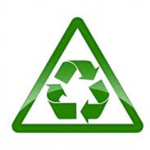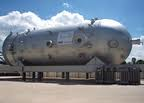Every day modern civilization uses vast amounts of energy and generates billions of tons of waste. This waste includes sewage solids, municipal solid waste (MSW) biomass, animal manure, plastics, agricultural wastes and other carbonaceous material = all of which represents the Carbon Energy Source.
 Man’s solution to this problem has been to dump wastes back into the earth, filling the land and sea with pollution – with biodegradation and/or incineration / combustion that is contribution to air pollution and a source of Greenhouse Gasses – principally methane (CH4) that is 21 times more harmful to the planet’s ozone layers than Carbon Dioxide (CO2).
Man’s solution to this problem has been to dump wastes back into the earth, filling the land and sea with pollution – with biodegradation and/or incineration / combustion that is contribution to air pollution and a source of Greenhouse Gasses – principally methane (CH4) that is 21 times more harmful to the planet’s ozone layers than Carbon Dioxide (CO2).
The global problem is rapidly diminishing landfill space or disposal capacity for societal wastes such as sewage, biomass, solids, MSW including effective and non-polluting utilization of high sulfur coal and the like. The resulting environmental land and groundwater contamination and degradation of air quality and there is also a need for alternative lower cost energy.
The RCR technology solves problems through the application of unique hydrocarbon conversion system that converts carbon wastes and coal to clean “non-polluting” energy recovery. The systems design represents proprietary technology, and recognized patents. The systems are operational and represent flexible and scalable modular plant designs that can use a variety of wastes or coal that can be ad-mixed together.
Energy output can be generated in the form of clean fuels and or electricity. They have a small physical footprint and compelling system efficiencies and economics that generate high revenue returns.
There is a better way – the RCR way! This technology can provide highly reliable and compact hydrocarbon conversion systems, allowing 90%(+) carbon to energy conversion efficiencies. RCR technology can use carbon waste materials, including coal, to generate clean Low Cost Energy and recyclable raw materials while either totally eliminating or greatly minimizing harmful air or water emissions.
By recovering societal environmental wastes and recycling this man-made resource RCR will help the planet reduce pollution, provide useful and clean energy and or low sulfur premium grade fuels and generate strong economic returns.
 The syngas produced from the process has a 1,217 BTU content that enables the syngas output to be capable of being compressed and stored if required and the process ash residue can represent recoverable value within RCR’s proprietary construction and demolition waste recovery and reuse program to produce a range of 60 viable cement-based products for sale.
The syngas produced from the process has a 1,217 BTU content that enables the syngas output to be capable of being compressed and stored if required and the process ash residue can represent recoverable value within RCR’s proprietary construction and demolition waste recovery and reuse program to produce a range of 60 viable cement-based products for sale.
RCR technologies are not only stand-alone resource recovery and recycling systems but also combined heat & power (CHP) technologies. These integrated systems produce both electricity and steam from a single fuel source at a facility that is strategically located near a consumer.
These efficient systems recover heat that normally would be wasted in an electricity generator’s exhaust, and save the fuel that would otherwise be used to produce heat or steam in a separate unit.
CHP systems offer dramatic advantages in efficiency and much lower air pollution than conventional technologies. A wide variety of CHP technologies generate electricity and meet thermal energy needs (direct heat, hot water, steam, process heating and/or cooling) simultaneously, at the point of use. By contrast, conventional generation of electric power throws away much of the heat generated in production, and conventional thermal energy generation often misses an easy opportunity to generate power.
Due to their capture of useful energy both as electricity and thermal output (heating, cooling, steam, hot water, dehumidification, etc.), CHP systems consistently exceed the total fuel efficiency of even the best central power plants, dividing the energy content of the fuel inputs into the delivered energy content of the total useful output, and taking average transmission and distribution line losses into account.
RCR International can integrate state-of-the-art centralized systems (a combined-cycle combustion turbine fueled from oil or syngas produced from resource recovery and recycling) resulting in maximum system fuel-efficiency for delivered power in the range of 75-80%.
The RCR Team will make your business more profitable while at the same time these solutions will also help build your company’s environmentally sustainable advantage.
RCR takes its responsibility for the environment very seriously and is fully committed to delivering a record of responsible environmental performance across all its operations. We continually strive to meet and where practicable exceed strict safety, health and environmental performance targets and we are committed to continuous improvement in all aspects of our operations. Excellence in safety, health and environmental performance is our top priority and we are open and honest about such performance, which we publish locally and nationally, as required.
RCR operates to strict regulations that are set by the national environment agencies, of the countries in which we operate. We are committed to ensuring that our facilities have as low an impact as possible on local people and the environment and we continue to work in close partnership with community groups and other stakeholders to ensure that we are a responsible neighbour.
By using clean and uncontaminated biomass fibre, toxic emissions are practically omitted. Compliance with all EU, UK and US air-quality standards is built into the plant design. The process is fully compliant with the Carbon Emissions Reduction Program of the Kyoto Protocol and carbon allowance credits are tradable for the renewable electricity and also for the diversion from landfill.
